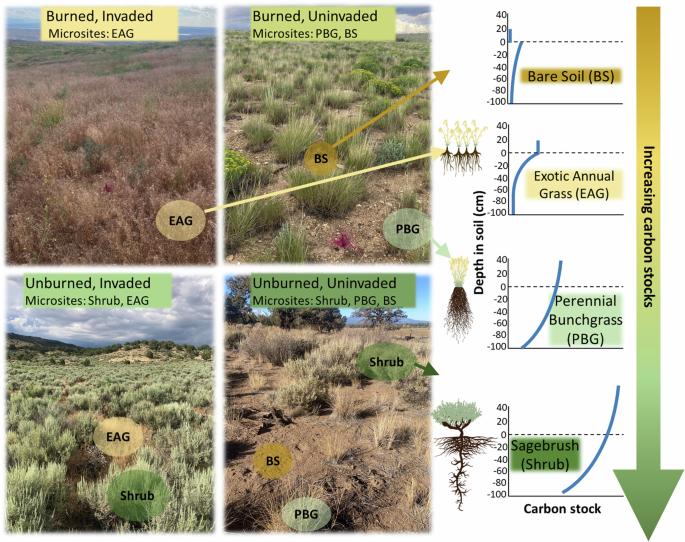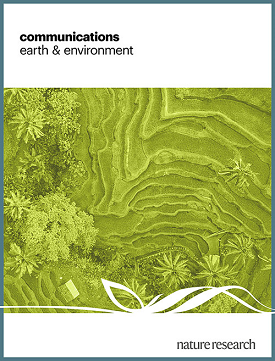Annual grass invasions and wildfire deplete ecosystem carbon storage by >50% to resistant base levels
IF 8.1
1区 地球科学
Q1 ENVIRONMENTAL SCIENCES
引用次数: 0
Abstract
Ecological disturbance can affect carbon storage and stability and is a key consideration for managing lands to preserve or increase ecosystem carbon to ameliorate the global greenhouse gas problem. Dryland soils are massive carbon reservoirs that are increasingly impacted by species invasions and altered fire regimes, including the exotic-grass-fire cycle in the extensive sagebrush steppe of North America. Direct measurement of total carbon in 1174 samples from landscapes of this region that differed in invasion and wildfire history revealed that their impacts depleted soil carbon by 42–49%, primarily in deep horizons, which could amount to 17.1–20.0 Tg carbon lost across the ~400,000 ha affected annually. Disturbance effects on soil carbon stocks were not synergistic, suggesting that soil carbon was lowered to a floor—i.e. a resistant base-level—beneath which further loss was unlikely. Restoration and maintenance of resilient dryland shrublands/rangelands could stabilize soil carbon at magnitudes relevant to the global carbon cycle. In the semiarid rangelands of the western US, the annual grass invasion and wildfire depleted the soil carbon in deep horizons and led to ecosystem carbon loss across 400,000 hectares, according to an analysis based on soil and biomass samples and statistical approach.

年度草入侵和野火将生态系统碳储存消耗到抗性基础水平的 50% 以上
生态干扰会影响碳储存和稳定性,是管理土地以保护或增加生态系统碳从而改善全球温室气体问题的一个重要考虑因素。旱地土壤是一个巨大的碳库,它正日益受到物种入侵和火灾机制改变的影响,包括北美大面积鼠尾草草原的外来草-火灾循环。对该地区不同入侵和野火历史的 1174 个地貌样本中的总碳进行直接测量后发现,这些入侵和野火的影响使土壤碳减少了 42-49%,主要是在深层,这相当于每年约 40 万公顷受影响地区的碳损失量为 17.1-20.0 兆吨。扰动对土壤碳储量的影响不是协同的,这表明土壤碳降低到了一个底限,即一个抗性基础水平,在这个水平之下,进一步的碳损失是不可能的。恢复和维护有弹性的旱地灌木林/牧场可以稳定土壤碳,其幅度与全球碳循环相关。在美国西部的半干旱牧场,根据基于土壤和生物量样本及统计方法的分析,一年一度的牧草入侵和野火耗尽了深层土壤中的碳,导致 40 万公顷的生态系统碳损失。
本文章由计算机程序翻译,如有差异,请以英文原文为准。
求助全文
约1分钟内获得全文
求助全文
来源期刊

Communications Earth & Environment
Earth and Planetary Sciences-General Earth and Planetary Sciences
CiteScore
8.60
自引率
2.50%
发文量
269
审稿时长
26 weeks
期刊介绍:
Communications Earth & Environment is an open access journal from Nature Portfolio publishing high-quality research, reviews and commentary in all areas of the Earth, environmental and planetary sciences. Research papers published by the journal represent significant advances that bring new insight to a specialized area in Earth science, planetary science or environmental science.
Communications Earth & Environment has a 2-year impact factor of 7.9 (2022 Journal Citation Reports®). Articles published in the journal in 2022 were downloaded 1,412,858 times. Median time from submission to the first editorial decision is 8 days.
 求助内容:
求助内容: 应助结果提醒方式:
应助结果提醒方式:


